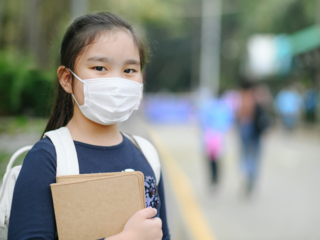Coronavirus Disease 2019
COVID-19's Back-to-School Fears and Questions: Year Two
New (but familiar) worries for the new school year.
Posted August 16, 2021 Reviewed by Ekua Hagan
Key points
- Concerns over contracting or spreading COVID-19 will heighten the usual back-to-school anxieties among kids and parents.
- Young children's fears about COVID-19 typically involve separation from parents, while older kids may tend to deny risks.
- When families don’t feel safe, learning and health suffer, so parents need to deal with their COVID fears first in order to help their kids.

By Daniel W. Prezant, Ph.D., Edited by Linda Michaels, Psy.D.
Summer’s end typically brings a range of emotions—from excitement to curiosity to fear—about the new school year. Kids and parents alike wonder what the new grade or school will be like. Kids worry, "Will my teacher like me? Will old friends still like me? Will I make new friends?" Parents worry, "Will my child like their teacher? Will they be happy? Will they thrive?"
Now, as if these questions weren’t enough, the COVID-19 pandemic has created new worries. It can be helpful for kids and parents to acknowledge their questions and anxieties, and know these worries are normal.
Here are some examples of common anxieties:
Kids’ Worries
- I heard COVID is bad again—will going to school get me sick?
- I didn’t learn much last year—how can I move up a grade?
- Will school open and stay open?
- Will my friends go back to school?
- Will I have to wear a mask all day?
- How often do I have to wash my hands?
- Will going to the bathroom get me sick?
- If someone hugs me, will I get them sick or will they get me sick?
- Will I get my younger sibling (who isn’t eligible to be vaccinated) sick?
- If I get someone sick will it be my fault?
- What if someone dies?
Parents’ Worries
- Are schools safe with the new Delta variant and RSV?
- My kids are too young to be vaccinated—how can I send them back safely?
- Will schools open and close repeatedly?
- If I’m at work, what will I do with the kids if school is closed?
- My kids always get sick during the school year. How will I know if it’s a cold or COVID-19?
- Will they bring COVID home and give it to us?
- What if someone dies? Will it be my fault?
Will someone please tell me what to do?
Unfortunately, it's hard to know what to do and the stakes are high: The situation is evolving, life-threatening, and involves our children. There's no script to follow because no one solution will work for everybody. We also cannot ignore COVID; pretending that going to school means going back to normal will actually make it harder to adjust to school. Finally, the things we do to keep everyone safe and healthy—masks, physical distance, pods, and COVID-19 testing—can actually stir up anxieties, reminding us that things are not normal.
What can I do?
We know that kids’ feelings about returning to school will be greatly influenced by their parents. To paraphrase the sage wisdom of Mr. Rogers, kids can manage whatever their parents can manage. If parents don’t feel safe, their kids won’t feel safe. When families don’t feel safe, learning, physical health, and psychological health suffer.
So, one key goal for parents is to figure out how they can feel safer and calmer themselves. Putting on your own oxygen mask first will help your kids feel safer. Also, the age and the developmental stage of a child will greatly affect what going back to school means to them.
Here are some age-appropriate considerations:
Pre-K
Typically worries for kids this age are about separation and losing parents. Fears about COVID will only intensify these worries. Parents should limit their child’s exposure to COVID news on TV and the internet. Simple statements are best: “We help everyone by wearing masks, washing our hands, and giving everyone space to stop this virus.” Parental reassurance about how much they love and will protect their child is crucial.
Kindergarten to 2nd Grade
These children try very hard to follow rules to prevent themselves from acting on their wishes. Violating rules leads to overwhelming guilt and a wish to be punished. Breaking rules about COVID-19 has the power to turn children’s worst fears into reality. Parents should avoid battles about right and wrong. Instead, try recognizing that everyone makes mistakes and address what the child can do the next time to feel better about themselves.
Middle School
Middle school age kids focus on friends and popularity. Being masked in school means fewer opportunities to connect with others and learn who they are outside the family. Kids may deny the risks and blame parents for interfering with friendships. Parents may be more controlling of tweens and early teens because they fear the kids' budding sexuality and future separations. Parents can help by being empathic about what their children are missing out on. Instead of battling about who knows best, parents should provide more neutral sources of COVID-19 information, such as a trusted website.
High School and College
High school and college kids define themselves outside of their families. Sexuality becomes an important way to know themselves. The normal family conflicts over who’s in charge, anger at parents, denying vulnerabilities, and sexual experimentation become amplified as COVID-19 decreases one’s sense of safety and potentially increases a need to deny risks. Parents may become more controlling as a way to deny a growing awareness that they have less control. However, parents would be better served by providing information from experts outside of the family than by getting into tugs of war over who’s in control.
Parents
It's normal to feel anxious, guilty, and conflicted when information about COVID-19 keeps evolving and you must make complicated decisions about your kids with uncertain information. It’s also normal to be angry when you’re trying to protect your kids, but they blame you for ruining their lives. Expect meltdowns and fights. Try to not take it personally.
Keep in mind that COVID-19 has created new challenges and problems for all age groups, including parents and couples. It is extremely important that you and your partner deal with your troubling feelings so that you can help your kids deal with their overwhelming feelings. Getting the support you need will help you parent better and also help your kids.
About the author: Daniel W. Prezant, Ph.D. is a Training and Supervising Analyst at the New York Psychoanalytic Society and Institute (NYPSI) where he is also a Supervising Analyst in Child and Adolescent Analysis. He is in private practice for analysis and therapy with children, adolescents, adults, parents, and couples. Dr. Prezant is also the acting co-chair of The American Psychoanalytic Association's COVID-19 Advisory Team.




